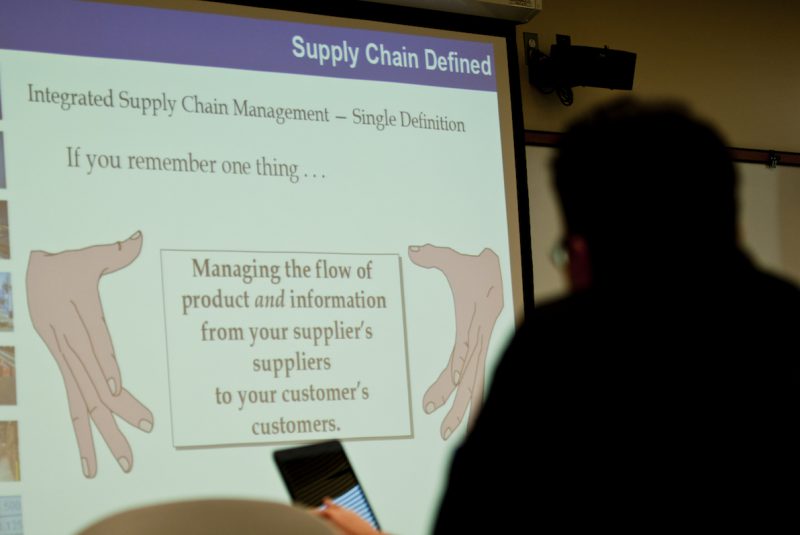
Culinary careers are sizzling again as the hospitality and restaurant industry bounces back from the pandemic and seeks to fill the positions vacated during the COVID-19 downturn. Chaffey College is doing its part to get more cooks in the kitchen.

Opportunities abound.
That’s the message from career education instructors at community colleges in the Inland Empire/Desert region, who are preparing students with work-ready skills to land good-paying jobs in the thriving global trade and logistics management industry.
“Global trade and logistics is the backbone of the economy, not only in our region, but throughout Southern California,” said Robert Corona, who – as deputy sector navigator for global trade in the Inland Empire/Desert region – facilitates the alignment of community college career programs with industry needs. “The ports of Los Angeles and Long Beach are the largest in the nation, and a lot of what goes through the port goes through the Inland Empire. It is a massive ecosystem that is a driver and provider of jobs.”
At its core, global trade is the movement of goods and services throughout the world, and that encompasses four major areas: financial, logistical, legal, and marketing. The greater Los Angeles area is considered by many to be the center of international commerce in the United States, and the Inland Empire now ranks 24th in the nation in export-supported jobs, according to the Brookings Institute. What’s more, the workforce is expected to grow by more than 11 percent annually.
Don’t expect a slowdown anytime soon.
In the Inland Empire, projections call for an additional 24,351 jobs, for a total of nearly 310,000 in the five-year period ending in 2020. Wages vary according to occupation and education. The median salary of the nearly 15,000 first-line supervisors of office and administrative support workers with a community college-level education in 2015 was $23.66 per hour, or more than $49,000 annually. Secretaries and administrative assistants were earning up to $25.13 per hour. Customer service representatives were earning up to $26.98 per hour. Maintenance and repair workers were earning up to $29.47 per hour. And first-line supervisors of office and administrative support workers were earning up to $38.62 per hour, or more than $80,000 annually.
Approximately 40,000 people working in the global trade and logistics industry in the region are employed in warehousing and storage (with an average annual wage of $44,312), and projections call for employment growth of 42 percent over the next five years. More than 16,000 of these employees are customer service representatives, with an additional 13,000 employed as sales representatives in the areas of wholesale and manufacturing. And just shy of 13,000 are maintenance and repair workers. Other major employment opportunities exist in real estate (7,585 jobs in 2015), legal services (6,937 jobs), and machinery, equipment and supplies merchant wholesalers (4,854).
In all, California exports more than $161 billion worth of goods annually, leading to high-paying jobs for more than one million people in the state. And community colleges are on the front line in workforce training. The California Community Colleges system boosted spending on workforce training programs, nine-fold, to $900 million in 2017 over the past five years. In 2016, it launched the Strong Workforce Program, a recurring $200 million annual investment to expand career education programs as part of an effort to create one million more middle-skilled jobs.
When it comes to global trade and supply chain management, workforce training programs at Barstow Community College, Norco College, Riverside City College, and Chaffey College are among the best in the business.
Every community college career and technical education program works closely with business and industry in addressing workforce needs. Student debt? Almost unheard of. In addition, students are taught by people with years of experience in the field and established industry connections.
“Having been a logistics manager for more than 20 years, it is a great privilege to offer professional education and perhaps even inspiration for current and future logistics industry managers,” said Rex Beck, professor of logistics management at Norco College. “I can’t think of an Inland Empire industry more deserving of whatever support Norco College can provide.”
In fact, Norco College, which has been providing educational opportunities to those preparing for leadership positions in logistics management for 16 years, was a pioneer in developing logistics industry leaders at the community college level, and has awarded a total of nearly 250 certificates and associate degrees in logistics management that are putting people to work.
Said Corona: “Our colleges are doing an excellent job in educating and preparing students for pathways to global companies, and there are plenty in the region to choose from.”
About IEDRC:
The Inland Empire/Desert Regional Consortium (IEDRC) consists of 12 community colleges. It serves as a regional framework to communicate, coordinate, collaborate, promote and plan career and technical education and workforce and economic development in the Inland Empire/Desert Region.
Contact:
Ashley Etchison
Director, Strategic Communications & Marketing
Strong Workforce Program
2001 Third Street, Norco, CA 92860
(951) 372-7086
Ashley.Etchison@norcocollege.edu

Culinary careers are sizzling again as the hospitality and restaurant industry bounces back from the pandemic and seeks to fill the positions vacated during the COVID-19 downturn. Chaffey College is doing its part to get more cooks in the kitchen.

Dual Enrollment (DE) is catching on as students and their families recognize the advantages of earning college credit while still working towards high school graduation. But students aren’t the only… Read More – Good News for Community Colleges: Dual Enrollments Are on the Rise

Enrollment in courses not offering credit toward a degree or certificate are outpacing for-credit programs in some states (Fed Communities). And it’s no wonder. With the convenience, minimal time commitment,… Read More – No Credit, No Problem: Noncredit Courses Gain Steam